Why dedicate just one day to highlighting women’s achievements and flying the flag for gender equality when you could do so for an entire year? That was the thinking behind the Ministry of Social and Family Development’s (MSF) decision to declare 2021 as the Year of Celebrating SG Women. Throughout last year, numerous events and initiatives — some organised by NUS — were held to pay tribute to the achievements of women in Singapore and support their continued progress. These included gatherings to celebrate female trailblazers in their respective fields, candid conversations about women’s position in society, social media campaigns encouraging people to challenge gender norms, and more.
However, progress rarely follows a straight line. While women in the 21st century do enjoy more rights and privileges than those of previous generations, they are still far from being on an equal footing with men. Persistent sexist attitudes, gender-based pay disparities, and the COVID-19 pandemic’s disproportionate impact on women are some of the obstacles they continue to come up against. Joining the fight and doing their part are the women (and men) of NUS.
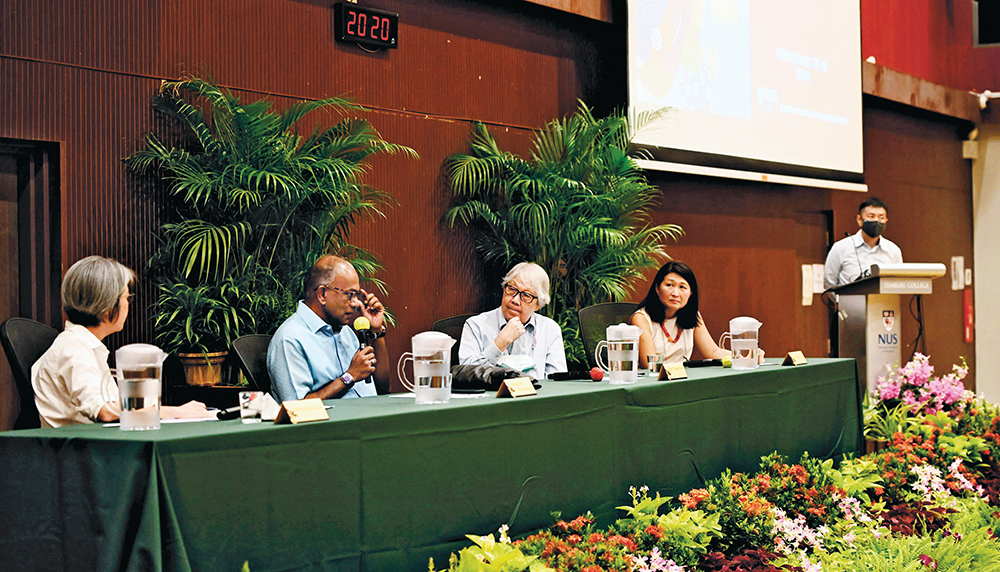 Ms Corinna Lim, Minister K Shanmugam, Prof Tommy Koh and Ms Junie Foo at the Tembusu Forum.
Ms Corinna Lim, Minister K Shanmugam, Prof Tommy Koh and Ms Junie Foo at the Tembusu Forum.
SPARKING A CHANGE IN MINDSETS
To mark International Women’s Day on 8 March 2021, Tembusu College held its flagship Tembusu Forum, which was themed ‘Women in Singapore: Justice, Equality and Respect’. With the college’s rector Professor Tommy Koh (Law ’61) as moderator, a three-member panel comprising Mr K Shanmugam (Law ’84), Minister for Home Affairs and Law; Ms Corinna Lim (Law ’87), Executive Director, Association of Women for Action and Research (AWARE); and Ms Junie Foo (Arts and Social Sciences ’90), President, Singapore Council of Women’s Organisations (SCWO), discussed issues such as whether the country prioritises gender equality as a core value, the limitations of the Women’s Charter, and the possibility of amending the Constitution to expressly prohibit sex-based discrimination.
Ms Stacy Fernandes, a third-year College of Humanities and Sciences student then residing at Tembusu College, was among the in-person attendees at the hybrid event. During the Q&A session, the Political Science major brought up the underrepresentation of women in politics and asked whether Singapore is ready for a female prime minister. Mr Shanmugam noted that there are several women leaders in politics, including Ministers Ms Indranee Rajah (Law ’86), Ms Grace Fu (Business ’85) and Mrs Josephine Teo (Arts and Social Sciences ’90). That said, he acknowledged more could be done to shift societal mindsets away from traditional gender roles which cast men as breadwinners and women as caregivers, and to provide more support for women entering the political sphere.
“After the Forum, a lot of my peers who watched it online reached out to me with their own points of view. It led to productive and meaningful conversations, and I felt this was exactly the type of ground-up change that the Minister was referring to when it comes to reshaping societal values,” Ms Fernandes, 22, tells The
AlumNUS. “In the microcosm of our university environment, it is easy to believe that we’re somehow making a change when we participate in forums and discussions like this or have collective — generally progressive — attitudes regarding such issues. But there is a whole country out there, and change doesn’t come as easily to everyone. Nevertheless, it is still progress, no matter how small the scale might be, and it can be a starting point for further, greater things.”
2021 also saw not one but two women-centric
WoW events, a series founded by NUS Alumni Advisory Board member Dr Intan Azura Mokhtar (Science ’98). The first was the
WoW:
In Conversation session on 10 March, when then-Manpower Mrs Josephine Teo joined several other distinguished NUS alumnae for a Zoom discussion on how to improve gender diversity and inclusion in the workforce. The second was a new spin-off called
WoW:
Ignite – TIES (Technological, Informational and Educational Sharing) on 1 September. Speakers including fellow NUS Alumni Advisory Board members Ms Janet Ang (Business ’82), a Nominated Member of Parliament who serves on many boards; Ms Goh Yiping (Design and Environment ’05), an e-commerce whiz and advocate of female technopreneurship; and Ms Trisha Suresh (Public Policy ’11), Public Policy and Economic Graph Manager of LinkedIn, shared personal stories and tips on empowering oneself in today’s career landscape.
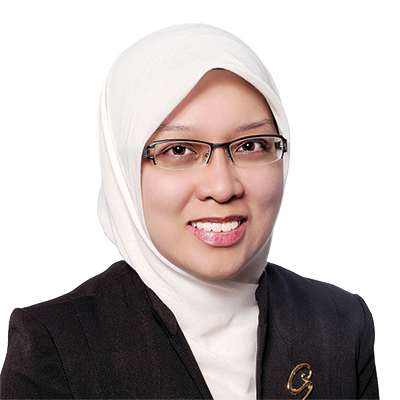
The reality is that there are more men in positions of leadership, influence and power. Through the WoW series, I hope to provide more opportunities for women’s voices to be heard and shared, and to inspire other female alumnae, students and staff on their journey to success.
Dr Intan Azura Mokhtar, NUS Alumni Advisory Board member
“I envisioned
WoW: In Conversation to be a dialogue on issues that women are concerned about, such as empIoyability and gender stereotypes. With
WoW: Ignite – TIES, I wanted to create a TED Talk-kind of platform, where [established] female alumnae share their experiences, views and insights,” says Dr Intan. “The reality is that there are more men in positions of leadership, influence and power. Through the
WoW series, I hope to provide more opportunities for women’s voices to be heard and shared, and to inspire other female alumnae, students and staff on their journey to success.”
ALL A-BOARD
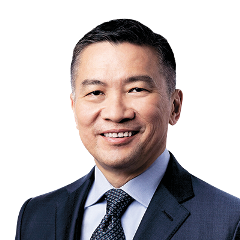
One recurring issue that came up at the Tembusu Forum as well as the
WoW session in March was the lack of women in corporate boardrooms. This is a cause close to Mr Loh Boon Chye’s (Engineering ’89) heart. The CEO of Singapore Exchange (SGX) co-chairs the Council for Board Diversity (CBD), whose objective is to increase women’s participation on boards across the private, people and public sectors.
As Mr Loh explains, gender-diverse boards are not just good for women but make good business sense — more so in these uncertain times: “The impact of the pandemic has been unprecedented, and led to fundamental changes in how businesses operate, challenges in keeping up staff wellbeing, as well as unexpected and regular disruptions as the coronavirus evolves and spreads. These developments call for different skills and expertise and have put diversity at the leadership level squarely in the limelight. Having diverse perspectives and thoughts in a board will ensure that the organisation considers a wide range of risks and opportunities in planning its strategic priorities.”
Things are gradually moving in the right direction, with the proportion of women sitting on the boards of the top 100 primary-listed companies on SGX more than doubling from 7.5 per cent in 2013 to 18 per cent in June 2021. To reach the CBD’s long-term goal of an equal proportion of male and female directors on boards, Mr Loh urges everyone — both men and women — to play their part. “As part of good governance, organisations should widen the pool of candidates and involve external parties including search professionals. Women with the skills and experience required by boards are encouraged to avail themselves. Investors, regulators and other stakeholders must also clearly express their expectations of companies’ board diversity policies and disclosures.”
MOTHERHOOD PENALTY, FATHERHOOD BONUS
The issues fuelling gender disparity in Singapore were front and centre at the Institute of Policy Studies (IPS) Women’s Conference on 3 June 2021. As part of a panel discussion on the topic of ‘Equal Work, Equal Pay’, Associate Professor Jessica Pan from NUS Department of Economics argued that there remains a significant (albeit narrower) gender pay gap, even though women have caught up with — and, in some cases, surpassed — men in educational attainment.
According to a 2020 report which Assoc Prof Pan co-authored with the Ministry of Manpower, the wage gap between men and women in 2018 — after adjusting for factors such as age, education level and occupational differences — was six per cent. She attributes much of it to the “motherhood penalty” in an interview with The
AlumNUS: “Data from many countries show that men’s and women’s earnings tend to increase at the same rate until the arrival of the first child, after which women’s wage growth slows down and does not recover even 10 to 20 years later. This is also the case with couples who are similarly educated or where the female partner has better earning potential.”
 Assoc Prof Jessica Pan spoke at the virtual IPS Women’s Conference.
Assoc Prof Jessica Pan spoke at the virtual IPS Women’s Conference.
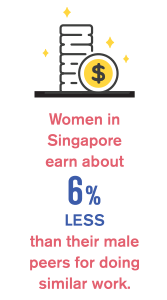
Assoc Prof Pan puts forward various reasons why child-rearing penalises women in their careers more heavily compared to men. For one, stubborn social norms mean that women are still expected to take time off work and be the main provider of childcare within the household. To make matters worse, the parenting burden — which often falls on mothers — has been heightened by the culture of ‘intensive parenting’ and greater competition for school places. In addition, rewards for working long and inflexible hours have increased considerably over time, but many women are less amenable to doing so due to their larger share of family responsibilities. “It’s a double whammy,” she laments.
How can we address this thorny problem? “We should think of policies that benefit not just women, but both men and women — that is, family-friendly policies directed to helping both men and women balance their roles in the workplace and as caregivers,” says Assoc Prof Pan. For example, instead of simply extending maternity leave, employers could craft parental leave provisions that incentivise or encourage men to share the workload at home. Another solution is to offer flexible working arrangements while ensuring that those who utilise this option are not penalised for it.
There has been quite a bit of movement towards the latter trend in the wake of the pandemic. On the one hand, COVID-19 and the intermittent school closures have affected working mothers globally, with many being forced to leave their jobs to pick up the slack at home. But on the other, Assoc Prof Pan spots a potential silver lining: “Prior to COVID-19, the idea of working from home every day or meeting important clients over Zoom was deemed impossible. The pandemic dealt an exogenous shock to the way the labour market does things. As we transition from pandemic to endemic, companies are revisiting their workplace policies and starting to see that remote or flexible working on a permanent basis is feasible. This could benefit women as well as men.”
![]()
We should think of policies that benefit not just women, but both men and women — family-friendly policies directed to helping both men and women balance their roles in the workplace and as caregivers.
Assoc Prof Jessica Pan, Department of Economics, NUS
GETTING A HEAD START
Baby or no baby, many young women experience barriers and biases in the workplace that could hinder their career progression. In a 2020 survey conducted by NUS Centre for Future-ready Graduates (CFG), female alumnae shared that the biggest challenges they faced in their first year of work were voicing disagreements, suggesting ideas or raising questions, building relationships with senior management, and managing stress and workload. “All of these are critical to succeeding in the early years of career development,” says Ms Camilla Tam, Head of Learning and Development at CFG.
To address this, CFG piloted a new
Women’s Professional Development Programme (WPDP) in February 2021 for a group of 30 penultimate and final-year female students. “The
WPDP aims to empower female students with the mindsets and skills to overcome workplace challenges and grasp opportunities early in their careers, to set them on a strong trajectory,” says Ms Tam. Over a six-week period, participants brainstormed, pitched and role-played their way through sessions on human-centred design, personal branding, self-advocacy, managing difficult conversations and building a support network.
Ms Calissa Man, now in the final semester of her Political Science degree at NUS, believes taking part in the
WPDP has boosted her confidence and better prepared her for the working world. “I got to upskill myself and deepen my interest in design thinking and user-centric solutions. I also gained tips to network effectively and formed meaningful connections with peers, young alumnae and female leaders,” says the 22-year-old. Come January 2022, CFG will embark on the second run of the
WPDP.
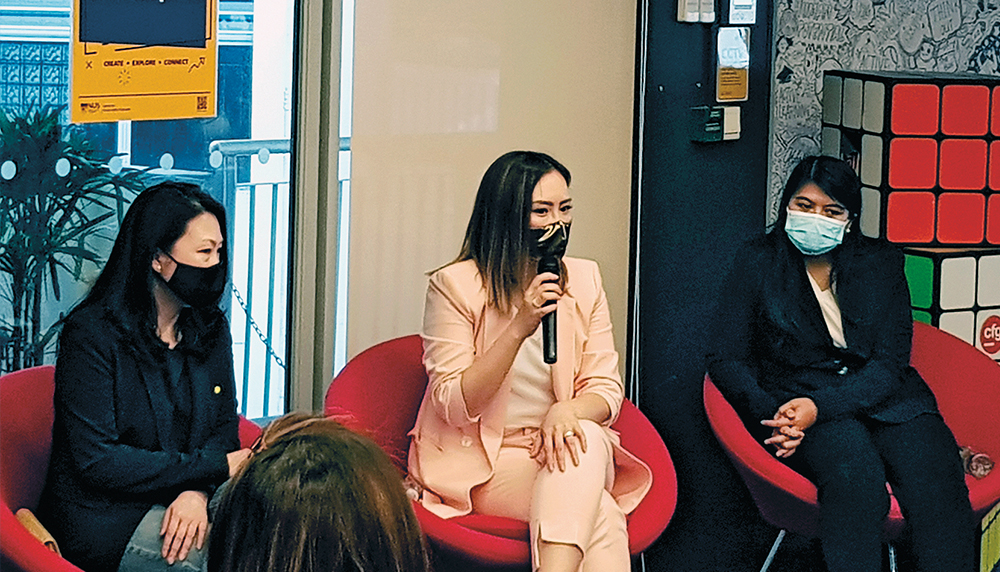 Female leaders sharing their insights at the final WPDP session in March 2021.
Female leaders sharing their insights at the final WPDP session in March 2021.
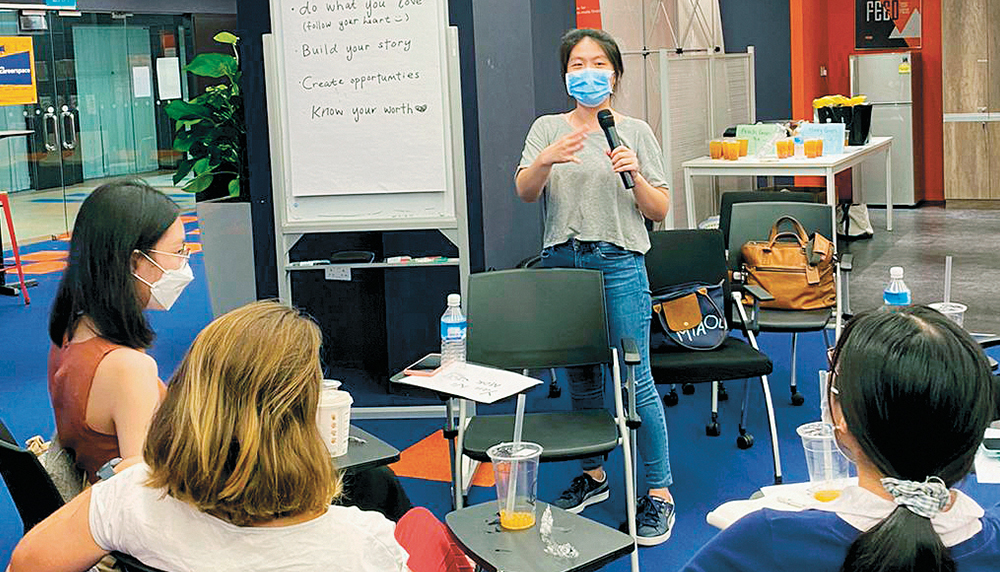 One of the participants presenting her key takeaways from the programme.
One of the participants presenting her key takeaways from the programme.
GENDER (IN)EQUALITY IN ACADEMIA
Female faculty members at higher education institutions have to contend with their own version of the ‘motherhood penalty’ in the form of the tenure-track process. Tenured professors enjoy higher wages, job security and academic freedom, but the path to becoming one is long, arduous and highly competitive. It is especially trying for female academics who have young children to care for. As a result, many end up making the difficult trade-off between dropping out of the tenure track and delaying starting a family.
NUS has responded in recent years by introducing pro-family policies to level the playing field for women. When female faculty members welcome a new baby, they can now delay their tenure review by up to a year; and if both parents are NUS academics, either one can opt to extend their tenure clock. A childcare centre has also been set up at the Kent Vale campus to support faculty and staff with young children.
Assoc Prof Pan, whose two children — a five-year-old and a five-month-old — were born after she got tenure, is appreciative of these measures. “As an employer, NUS has done well in implementing gender-neutral policies, and it continues to try to do more to help female faculty,” she says. For instance, since 1 April 2021, the University provides teaching relief for new mothers (or fathers, if both partners are NUS academics), which effectively halves their teaching load for one semester after returning from maternity leave. The two-year cap for the tenure clock extension (for having two children) has also been removed, thus benefitting those who wish to have more children.
![]()
Over the years, there has been a gradual increase in women who assumed academic or administrative leadership roles. However, the senior leadership positions at Cluster Head, Dean and Chief Executive levels are all held by men. There is still a leaking pipeline of women that we need to address.
Assoc Prof Gan Yunn Hwen, Department of Biochemistry and Assistant Dean (Equal Opportunities and Career Development), NUS Yong Loo Lin School of Medicine
Efforts to ensure that male and female teaching staff receive equal opportunities for career advancement take on even more importance in the science, technology, engineering and mathematics (STEM) fields, which have historically been dominated by men. Data supplied by NUS reveals that the proportion of women faculty members in STEM disciplines hit 30.2 per cent in 2021, and the figure was higher — at about 40 per cent — in healthcare-related fields such as medicine, dentistry and public health. While this indicates a slight upward trend, more could be done to boost their numbers.
At the Yong Loo Lin School of Medicine, the task of fostering gender equality in the workplace is led by its Office of Equal Opportunities and Career Development (EOCD). “EOCD is committed to promoting equal opportunities for all and to ensuring that women are able to not just enter but also advance in their scientific and medical careers,” says the Office’s Assistant Dean, Associate Professor of Biochemistry Gan Yunn Hwen. For example, EOCD organises quarterly
Lunch & Learn sessions in partnership with the National University Health System’s (NUHS) Women in Science and Healthcare (WISH) group. Billed as an inclusive networking platform, this series encourages learning and sharing on current and trending issues in the fields of healthcare and STEM. An EOCD Seed Grant has also been created to support NUS and NUHS researchers (male and female) whose work examines gender-related issues in healthcare.
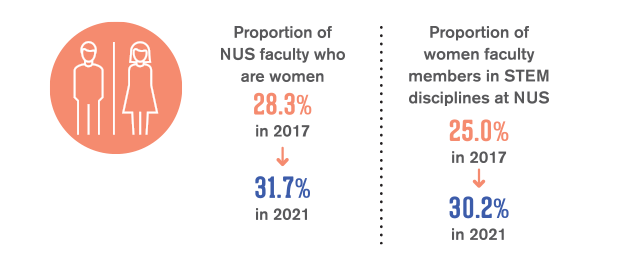
“Over the years, there has been a gradual increase in women who assumed academic or administrative leadership roles,” says Assoc Prof Gan. “However, the senior leadership positions at Cluster Head, Dean and Chief Executive levels are all held by men. There is still a leaking pipeline of women that we need to address.” To that end, EOCD runs workshops to raise awareness of cognitive biases as well as equip female staff with leadership and mentoring skills. The Office also works closely with NUHS and NUS Medicine conference organisers to ensure that women are represented in organising committees and speaker panels.
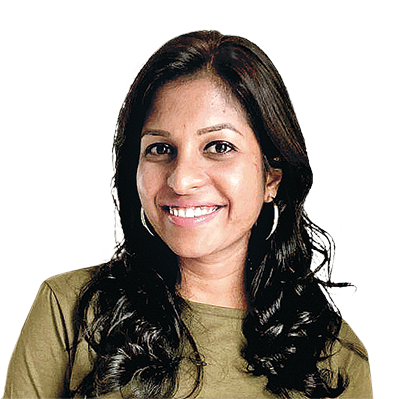
It was at NUS where, for the first time, I felt I was recognised for my talent, and not for any demographic factor. There was a culture of inclusivity and appreciation for diversity among the student community.
Dr Viveka Kalidasan, NUS alumna & one of Singapore’s top 100 Women in Tech in 2021
BREAKING THE GLASS CEILING
A slightly rosier picture emerges when looking at the gender composition of students pursuing STEM degrees. Based on the combined university intake data from 2019, the Ministry of Education reported that women made up 41 per cent of the cohort in STEM courses, up from 38 per cent in 2017. In the STEM workforce, however, women remain a minority and are even less visible in senior leadership roles or high-paying jobs. Yet that has not stopped some women from achieving breakthrough innovations and shattering the long-held myth that STEM is exclusively the domain of men.
Several success stories come from NUS, and span generations — from Dr Oon Chiew Seng (Medicine ’48), one of Singapore’s first obstetrics and gynaecology practitioners, to Ms Aw Kah Peng (Engineering ’90), Chairperson of Shell Companies in Singapore. Both were honoured at separate events in 2021, in keeping with MSF’s Year of Celebrating SG Women. In January, 104-year-old Dr Oon was conferred an Honorary Doctor of Letters at a special ceremony in recognition of her pioneering contributions to women’s health and dementia research. And in September, Ms Aw — who was also recently conferred the NUS Distinguished Alumni Service Award — and a few other prominent Faculty of Engineering alumnae took part in a ‘Woman in NUS Engineering’ hybrid event, where they reminisced about their university days and shared their career struggles and triumphs with the audience.
Among the younger alumnae, there is a new inductee in the 2021 Singapore 100 Women in Tech list: Dr Viveka Kalidasan (Engineering ’16) from the Agency for Science, Technology and Research (A*STAR). Dr Kalidasan’s interest in nano-biomaterials led her to obtain a PhD at NUS. She has since spearheaded the invention and translation of WiSe, a wireless sensing platform that can monitor post-surgical complications in real time. Now with A*STAR’s Translational Biophotonics Laboratory, she champions the development and commercialisation of biophotonic technologies for medtech and femtech applications.
Having grown up with two doctors as parents, Dr Kalidasan, 33, counts herself as one of the lucky ones. “My parents have always been my biggest supporters and mentors. As a child, I was allowed to dream and to pursue that dream. Having this supportive ecosystem set the foundation for me to pursue a career in STEM and medtech, and to make good use of the opportunities given to me,” she says. That includes her time at NUS. “It was at NUS where, for the first time, I felt I was recognised for my talent, and not for any demographic factor. I also joined NUS Entrepreneurship Society during my PhD studies, and almost the entire society was run by undergraduates, half of whom were women. There was a culture of inclusivity and appreciation for diversity among the student community.”
Life in the real world has been comparatively tougher, says Dr Kalidasan. “Being a minority female in the deeptech-medtech space can be challenging. I’ve had people doubting my calibre as an innovator and technopreneur, because my identity as an Asian woman precedes my capability and talent. Based on personal experience, and after talking to women in similar positions, I feel that once research and translational milestones are achieved, people expect women to take a backseat while the rest of the commercialisation journey is then driven by men. This undermines the women’s efforts. I hope it changes soon.”
That is why she is passionate about “paying it forward” and being a positive role model. Apart from co-leading A*STAR’s new Diversity Working Group, Dr Kalidasan serves as a mentor for various start-ups and venture creation programmes. She is also the founder of Edify, a mentorship platform aimed primarily at empowering girls and women to pursue STEM careers. “Girls shouldn’t shy away from STEM. They are capable of more than they believe; they just need the right push and platform. With more women in key roles in these industries, we will have products and services that are better suited to women.”
A MAN IN A WOMAN’S WORLD
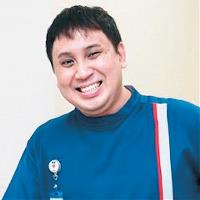
Gender segregation works both ways — while it is hard for women to break into STEM, men may also encounter challenges entering a female-dominated profession, like nursing. “I was the first person and the first male in my family to join the nursing sector,” says Mr Ibnu Firdaus Bin Nooraman (Nursing ’11), a Nurse Manager/Clinic Manager at Tan Tock Seng Hospital (TTSH). “I got some ribbing from a few family members and friends, who said that nursing made me ‘less manly’. But now, they regularly come to me and ask me about health-related matters!”
Mr Ibnu’s interest in nursing arose following the 2003 SARS outbreak, which left him inspired by the brave nurses working on the frontlines. He pursued a diploma in nursing and subsequently joined the Bachelor of Science (Nursing) programme in 2009, where he was one out of eight men in a cohort of 80 students. Now at TTSH, his years on the job have helped him grow as an ally for his female colleagues.
While there are situations where female colleagues must step in with us, Mr Ibnu, 34, asserts “The call to nurture is not bound to any gender.” He adds, “Men are often brought up in a ‘tough love’ environment and do not express care and concern as openly as women. But there’s nothing wrong with showing our ‘soft’ side through words and actions — not just when rendering patient care but in daily life too.”
IN PURSUIT OF PARITY
Beyond the STEM realm, the women of NUS are also proving that they can excel in areas typically perceived as masculine. Out of the five NUS athletes who represented Singapore at the Tokyo 2020 Olympics and Paralympics — the pinnacle of sports — two were female alumnae: marathon swimmer Ms Chantal Liew (Arts and Social Sciences ’20) and rower Ms Joan Poh (Nursing ’16). There are also female business titans like Ms Chua Sock Khoong (Business ’79), former Group CEO of Singtel; and Ms Claire Chiang (Arts ’74), co-founder of hospitality group Banyan Tree, entrepreneur and social activist. At the intergovernmental level, Dr Noeleen Heyzer (Arts and Social Sciences ’71) has blazed a trail at the United Nations (UN) and held multiple senior UN positions.
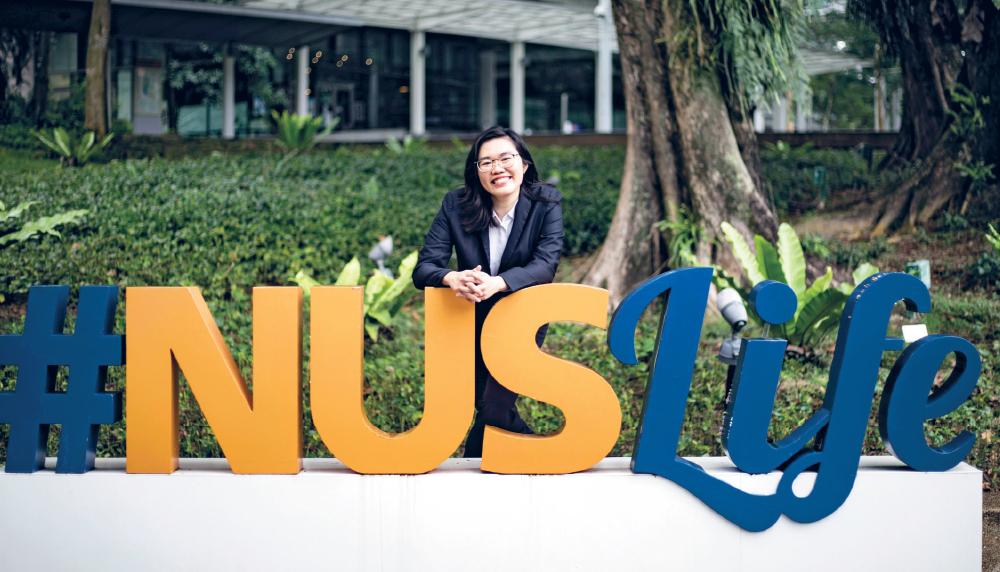
![]()
I was conscious that there would be more scrutiny on my presidency because of [my gender]. I tried to lead by example to show that leadership can come in many forms, not just the ‘strongman’ style that is often associated with it.
Ms Wee Su-Ann, NUSSU’s second female president (2020-2021)
Even the top student leadership position at NUS — President of NUS Students’ Union (NUSSU) — is slowly becoming more gender-diverse. To date, NUSSU has elected two female presidents: Ms Tay E Teng (Business ’07) and Ms Wee Su-Ann (Law ’21), who passed the baton to her (male) successor on 1 October 2021, after a year in office. “The fact that there have only been two female NUSSU presidents out of 43 is quite disappointing,” Ms Wee admits. “I was conscious that there would be more scrutiny on my presidency because of this. I tried to lead by example to show that leadership can come in many forms, not just the ‘strongman’ style that is often associated with it.”
During her term, Ms Wee and her team worked closely with the University’s senior management to promote student welfare on a host of issues, such as the new learning conditions brought about by the pandemic, adaptations to campus events and activities, and NUS’ internal restructuring initiatives. And with a woman at the helm, it was only natural that NUSSU would get involved in the
Year of Celebrating SG Women movement.
“I’m very proud of how the Union built up its advocacy efforts for gender equality. Besides having sanitary pad dispensers installed around NUS, we collaborated with other autonomous universities’ student leaders to prepare a Joint University paper on women’s issues. The paper highlighted students’ concerns on topics relating to sexuality education in schools, how institutes of higher learning deal with sexual misconduct, gender dynamics at the workplace, and unhealthy expectations of gender roles in society,” says Ms Wee. Their inputs formed part of a national review of women’s issues, whereby MSF conducted a year-long series of conversations with Singaporeans to solicit their views and ideas.
> From September 2020 to September 2021, the Government held 160 ‘Conversations on Singapore Women’s Development’ with over 5,700 people of both genders.
As Ms Wee, 23, embarks on a legal career, she hopes more female student leaders will step forward in the coming years. The provision of training, resources and financial support may help, for example. “Being the head of a student organisation is very public-facing and time-consuming, and some may not want that kind of pressure or publicity. At the same time, women are often more humble about their achievements or abilities and may not think that they are up to the task,” she explains. “Top leadership roles need to be seen as an attractive and attainable option — and that has to be achieved by creating an environment for all kinds of leaders to grow, regardless of gender or leadership style.”
WORK IN PROGRESS
After all the celebrations and activities of the past year, Singaporeans are anticipating the release of a White Paper on women’s issues, set to be tabled in Parliament in 2022. It will set out policy recommendations to further empower, protect and uplift women, and draw upon feedback received from the Government’s nation-wide conversations with both men and women. But regardless of what the White Paper contains, the proposals alone will not be a magic bullet for gender equality.
IPS researchers Dr Mathew Mathews (Arts and Social Sciences ’99) and Mr Syafiq Suhaini stressed this point in their CNA commentary on 3 October 2021: “While policy reforms can be quickly passed by Parliament, cultural change happens at a much slower pace. Greater sensitisation of gender equality and individual acceptance require time.” They added that it will also require “measured dialogue” to debate issues rather than identities, and an openness to “inclusive, diverse but tolerable nuances on the scale of equality”, given Singapore’s multicultural and multireligious context.
The pursuit of gender equality remains an uphill battle, and we will probably not get there as quickly as some of us would wish. It will take a whole-of-society effort and a readiness for the long haul. Perhaps someday, then, women will have equal opportunities and enjoy equal recognition as men — and articles such as this one need no longer be written.